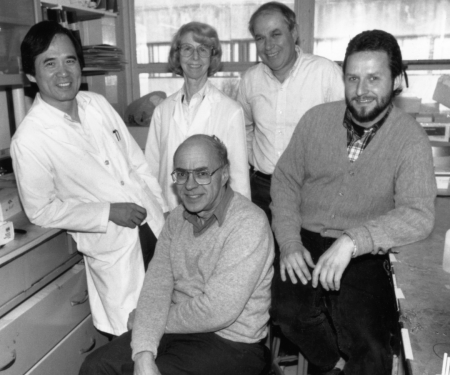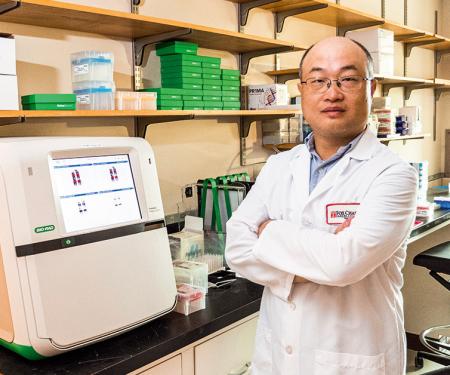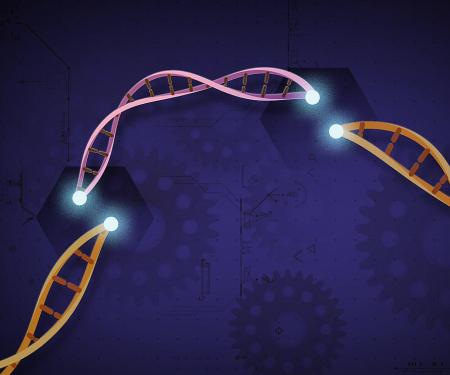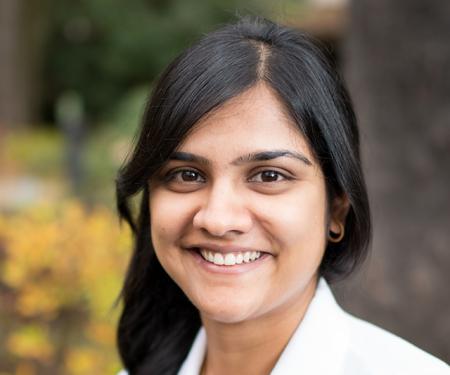Related Articles
00 / 00
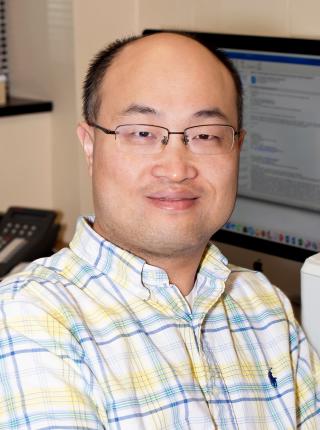
This Fox Chase professor participates in the Undergraduate Summer Research Fellowship.
Learn more about Research Volunteering.
Associate Professor
A deep knowledge of cellular immunology has accelerated our understanding of the molecular circuitry that drives human lymphoid malignancies, including common mechanisms of signaling, transcriptional regulation, and survival. Functional cancer genomics using high-throughput library screens have provided the foundation for molecular, cellular and genetic approaches to investigate the role and function of specific genes and pathways in cancer biology, which is essential not only to understand the molecular basis of cancer but also to develop the means to target these pathways therapeutically.
Our laboratory is mainly focused on the immune regulatory pathways in human lymphoid malignancies. We are interested in the immune signaling pathways, particularly key transcriptional factors and ubiquitin-mediated signaling, required for lymphoma pathogenesis and immunotherapy. We have established multiple high-throughput screening technologies, as well as animal models to rapidly and accurately identify key pathways that are suitable for targeted therapy and immunotherapy. As such, our lab focuses on following interdisciplinary directions:
#1: Although the significance of tumor microenvironment in the pathogenesis of lymphoid malignancies is indisputable, our understanding of the connection between the signaling input from the tumor microenvironment and genetic alternations in malignant cells is still at an elementary stage. We have developed analytic pipelines in HL and ALCL Lymphoma, using high-throughput CRISPR library screen, next-generation sequencing (NGS) and lymphoma mice models, to discover deep oncogenic mechanisms for how immune regulatory and protein ubiquitination pathway regulate the micro-environmental signaling to support tumor cell survival.
#2: The success of PD1/PD-L1 based immunotherapy highlights the critical role played by PD-L1 in cancer progression, and reveals an urgent need to develop new approaches to attenuate PD-L1 function by gaining insight into how its level is controlled. Using CRISPR library screen technologies and animal models, we are pursuing a comprehensive understanding of the molecular effectors required for PD-L1 regulation in lymphoma, especially the novel transcriptional factors and ubiquitination enzymes. The findings will provide new strategies to improve immunotherapy efficacy.
#3: We have also established a drug sensitization screen platform using the CRISPR library screen technologies, and we have started to investigate the therapeutic potential and resistance mechanism of some of the most promising anti-lymphoma drugs based on the insights into lymphoma pathogenesis that have emerged from our laboratory. These translational research works provide the mechanistic understanding of how new drugs act in lymphoma, leading to the rational design of new clinical trials for lymphoma patients.
Positions are available for postdoctoral fellows and rotation students. For postdoctoral fellows, please forward a cover letter and updated CV to Dr. Yibin Yang ([email protected]). For rotation and summer students, please contact Dr. Yibin Yang ([email protected]) for additional details.
Immune Signaling and Regulatory Pathways in Lymphoid Malignancies
My laboratory is mainly focused on the immune regulatory mechanisms in human lymphoid malignancies, with a particular interest in signaling transduction pathways and ubiquitin-dependent non-proteolytic/proteolytic machineries in lymphoma pathogenesis. Gaining insight into the pathological roles of these regulatory pathways can lead to improved understanding of the molecular circuitry that drives tumor survival and shapes the tumor microenvironment, as well as providing novel intervention strategies for targeted therapy and immunotherapy.
Positions are available for postdoctoral fellows and rotation students. For postdoctoral fellows, please forward a cover letter and updated CV to Dr. Yibin Yang ([email protected]). For rotation and summer students, please contact Dr. Yibin Yang ([email protected]) for additional details.
Song Z, Wu W, Wei W, Xiao W, Lei M, Cai Q, Huang DW, Jeong S, Zhang JP, Wang H, Kadin ME, Waldmann TA, Staudt LM, Nakagawa M, and Yang Y. Analysis and Therapeutic Targeting of the IL-1R Pathway in Anaplastic Large Cell Lymphoma Blood. 2023 Jun 20;blood.2022019166. PMID: 37339580
Wei W, Song Z, Chiba M, Wu W, Jeong S, Zhang JP, Kadin ME, Nakagawa M, Yang Y. Analysis and therapeutic targeting of the EP300 and CREBBP acetyltransferases in anaplastic large cell lymphoma and Hodgkin lymphoma. Leukemia. 2023 Feb;37(2):396-407. doi: 10.1038/s41375-022-01774-z. Epub 2022 Dec 1. PubMed PMID: 36456744; PubMed Central PMCID: PMC9949602.
Kadin ME, Morgan J, Wei W, Song Z, Yang Y. CD30 Regulation of IL-13-STAT6 Pathway in Breast Implant Associated Anaplastic Large Cell Lymphoma. Aesthet Surg J. 2022 Aug 24;. doi: 10.1093/asj/sjac234. [Epub ahead of print] PubMed PMID: 35999655.
Xiao C, Chen Z, Chen W, Padilla C, Colgan M, Wu W, Fang LT, Liu T, Yang Y, Schneider V, Wang C, Xiao W. Personalized genome assembly for accurate cancer somatic mutation discovery using tumor-normal paired reference samples. Genome Biol. 2022 Nov 9;23(1):237. doi: 10.1186/s13059-022-02803-x. PubMed PMID: 36352452; PubMed Central PMCID: PMC9648002.
Chiba M, Shimono J, Ishio T, Takei N, Kasahara K, Ogasawara R, Ara T, Goto H, Izumiyama K, Otsuguro S, Perera LP, Hasegawa H, Maeda M, Hashino S, Maenaka K, Teshima T, Waldmann TA, Yang Y, Nakagawa M. Genome-wide CRISPR screens identify CD48 defining susceptibility to NK cytotoxicity in peripheral T-cell lymphomas. Blood. 2022 Aug 3;. doi: 10.1182/blood.2022015646. PubMed PMID: 35921533.
Ishio T, Kumar S, Shimono J, Daenthanasanmak A, Dubois S, Lin Y, Bryant B, Petrus MN, Bachy E, Huang DW, Yang Y, Green PL, Hasegawa H, Maeda M, Goto H, Endo T, Yokota T, Hatanaka KC, Hatanaka Y, Tanaka S, Matsuno Y, Yang Y, Hashino S, Teshima T, Waldmann TA, Staudt LM, Nakagawa M. Genome-wide CRISPR screen identifies CDK6 as a therapeutic target in adult T-cell leukemia/lymphoma. Blood. 2022 Mar 10;139(10):1541-1556. doi: 10.1182/blood.2021012734. PubMed PMID: 34818414; PubMed Central PMCID: PMC8914179.
Song Z, Wei W, Xiao W, Al-Saleem ED, Nejati R, Chen L, Yin J, Fabrizio J, Petrus MN, Waldmann TA, and Yang Y. Essential role of the linear ubiquitin chain assembly complex and TAK1 kinase in A20 mutant Hodgkin lymphoma. Proc Natl Acad Sci U S A. 2020 Nov 2;202014470. doi: 10.1073/pnas.2014470117; PMID: 33139544.
Wang H, Wei W, Zhang JP, Song ZH, Li Y, Xiao W, Liu Y, Zeng MS, Petrus MN, Thomas CJ, Kadin KE, Nakagawa M, Waldmann TA, and Yang Y. A novel model of alternative NF-kB pathway activation in anaplastic large cell lymphoma. Leukemia. 2021 Jul;35(7):1976-1989. doi: 10.1038 /s41375-020-01088-y. Epub 2020 Nov 12.
Wei W, Lin Y, Song Z, Xiao W, Chen L, Yin J, Zhou Y, Barta SK, Petrus M, Waldmann TA, Yang Y. A20 and RBX1 regulate brentuximab vedotin sensitivity in Hodgkin Lymphoma models. Clin Cancer Res. 2020 Aug 1;26(15):4093-4106. doi: 10.1158/1078-0432.CCR-19-4137. Epub 2020 Apr 16.
Zhang JP, Song Z, Wang H, Lang L, Yang YZ, Xiao W, Webster DE, Wei W, Barta S, Kadin ME, Staudt LM, Nakagawa M and Yang Y. A novel model of controlling PD-L1 expression in ALK+ Anaplastic Large Cell Lymphoma revealed by CRISPR screening. Blood. 2019 Jul 11;134(2):171-185. doi: 10.1182/blood.2019001043. Epub 2019 May 31. PubMed PMID: 31151983; PubMed Central PMCID: PMC6624970.
Pazina T, James AM, Colby KB, Yang Y, Gale A, Jhatakia A, Kearney A, Graziano RF, Bezman NA, Robbins MD, Cohen AD and Campbell KS. Elotuzumab enhances SLAMF7 interactions between natural killer and multiple myeloma cells to co-stimulate cytotoxicity. Cancer Immunol Res. 2019 Aug 20. pii: canimm.0579.2018.
Barta SK, Zain J, MacFarlane AW 4th, Smith SM, Ruan J, Fung HC, Tan CR, Yang Y, Alpaugh RK, Dulaimi E, Ross EA, Campbell KS, Khan N, Siddharta R, Fowler NH, Fisher R and Oki Y. Phase II Study of the PD-1 Inhibitor Pembrolizumab for the Treatment of Relapsed or Refractory Mature T-cell Lymphoma. Clin Lymphoma Myeloma Leuk. 2019 Apr 3. pii: S2152-2650(18)31750-6.
Nakagawa M, Shaffer AL 3rd, Ceribelli M, Zhang M, Wright G, Huang DW, Xiao W, Powell J, Petrus MN, Yang Y, Phelan JD, Kohlhammer H, Dubois SP, Yoo HM, Bachy E, Webster DE, Yang Y, Xu W, Yu X, Zhao H, Bryant BR, Shimono J, Ishio T, Maeda M, Green PL, Waldmann TA, Staudt LM. Targeting the HTLV-I-Regulated BATF3/IRF4 Transcriptional Network in Adult T Cell Leukemia/Lymphoma. Cancer Cell. 2018 Aug 13;34(2):286-297.
Somech R, Lev A, Lee YN, Simon AJ, Barel O, Schiby G, Avivi C, Barshack I, Rhodes M, Yin J, Wang M, Yang Y, Rhodes J, Marcus N, Garty BZ, Stein J, Amariglio N, Rechavi G, Wiest DL, Zhang Y. Disruption of Thrombocyte and T Lymphocyte Development by a Mutation in ARPC1B. J Immunol. 2017 Dec 15;199(12):4036-4045.
Yang Y, Kelly P, Shaffer AL 3rd, Schmitz R, Yoo HM, Liu X, Huang da W, Webster D, Young RM, Nakagawa M, Ceribelli M, Wright GW, Yang Y, Zhao H, Yu X, Xu W, Chan WC, Jaffe ES, Gascoyne RD, Campo E, Rosenwald A, Ott G, Delabie J, Rimsza L, Staudt LM. Targeting Non-proteolytic Protein Ubiquitination for the Treatment of Diffuse Large B Cell Lymphoma. Cancer Cell. 2016 Apr 11;29(4):494-507.
Kelly PN, Romero DL, Yang Y, Shaffer AL 3rd, Chaudhary D, Robinson S, Miao W, Rui L, Westlin WF, Kapeller R, Staudt LM. Selective interleukin-1 receptor-associated kinase 4 inhibitors for the treatment of autoimmune disorders and lymphoid malignancy. J Exp Med. 2015 Dec 14;212(13):2189-201.
Yang Y, Staudt LM. Protein ubiquitination in lymphoid malignancies. Immunol Rev. 2015 Jan;263(1):240-56.
Yang Y, Schmitz R, Mitala J, Whiting A, Xiao W, Ceribelli M, Wright GW, Zhao H, Yang Y, Xu W, Rosenwald A, Ott G, Gascoyne RD, Connors JM, Rimsza LM, Campo E, Jaffe ES, Delabie J, Smeland EB, Braziel RM, Tubbs RR, Cook JR, Weisenburger DD, Chan WC, Wiestner A, Kruhlak MJ, Iwai K, Bernal F, Staudt LM. Essential role of the linear ubiquitin chain assembly complex in lymphoma revealed by rare germline polymorphisms. Cancer Discov. 2014 Apr;4(4):480-93.
Ceribelli M, Kelly PN, Shaffer AL, Wright GW, Xiao W, Yang Y, Mathews Griner LA, Guha R, Shinn P, Keller JM, Liu D, Patel PR, Ferrer M, Joshi S, Nerle S, Sandy P, Normant E, Thomas CJ, Staudt LM. Blockade of oncogenic IκB kinase activity in diffuse large B-cell lymphoma by bromodomain and extraterminal domain protein inhibitors. Proc Natl Acad Sci U S A. 2014 Aug 5;111(31):11365-70.
Mavrogiorgos N, Mekasha S, Yang Y, Kelliher MA, Ingalls RR. Activation of NOD receptors by Neisseria gonorrhoeae modulates the innate immune response. Innate Immun. 2014 May;20(4):377-89.
Yang Y, Shaffer AL 3rd, Emre NC, Ceribelli M, Zhang M, Wright G, Xiao W, Powell J, Platig J, Kohlhammer H, Young RM, Zhao H, Yang Y, Xu W, Buggy JJ, Balasubramanian S, Mathews LA, Shinn P, Guha R, Ferrer M, Thomas C, Waldmann TA, Staudt LM. Exploiting synthetic lethality for the therapy of ABC diffuse large B cell lymphoma. Cancer Cell. 2012 Jun 12;21(6):723-37.
Lim KH, Yang Y, Staudt LM. Pathogenetic importance and therapeutic implications of NF-κB in lymphoid malignancies. Immunol Rev. 2012 Mar;246(1):359-78.
We seek a postdoctoral fellow to join our efforts to apply multidisciplinary cutting-edge approaches to further our understanding of the immune regulatory mechanisms in lymphoma. The individual will engage in experiments involving CRISPR library screening, immunological analysis, next-generation sequencing, gene expression (RNA-seq), biochemical analysis, and eventually exploiting targeted and immunotherapy for human lymphoid malignancies. This is a unique opportunity for someone with expertise in immunology/molecular biology or next-generation sequencing techniques to learn complementary skills and become proficient in the translational study.
The candidate must have excellent skills in biochemistry/molecular biology or immunology, and ideally with experiences in animal models. Knowledge and expertise in cancer biology and/or immunotherapy and experience in high-quality flow cytometry-based assays, tissue culture, RNA-seq, cytokine multiplex assays and ELISA, next-generation sequencing are desirable.
Learn more about research at the Yang lab.
As one of the four original cancer centers to receive comprehensive designation from the National Cancer Institute, Fox Chase Cancer Center has been at the forefront of cancer research for almost 90 years. We are home to excellent research facilities, top clinicians and scientists, and outstanding patient care. Our singular focus on cancer, which couples discovery science with state of the art clinical care and population health, remains the foundation of our work.
The scientist training programs at Fox Chase Cancer Center provide professional development opportunities in four core areas identified as crucial for successful careers in science, research, and health care including communication, leadership, teaching, and mentorship. Upon joining the program, graduate students and postdocs develop individual development plans to help guide their growth. Training throughout the year is supplemented with free professional development opportunities, including a robust ‘How To’ series, writing courses, networking, mentorship, and teaching opportunities, a trainee-led seminar series, a trainee-led annual Research Conference, and more. Postdocs at Fox Chase Cancer Center are supported by the Temple University Postdoc Association and the Office of Academic Affairs at Fox Chase, and are compensated with competitive pay and benefits.
In addition to the robust training program, scientists at Fox Chase Cancer Center benefit from being part of the rich scientific and biotech environment in the Philadelphia region. Many of our former trainees are now employees (and contacts) at nearby institutions and companies, including The Wistar Institute, Merk, GSK, AACR, and numerous others.
Email a cover letter describing your research experience and your career plans, updated CV, and the names and contact information for three professional references to Yibin Yang, PhD at [email protected].
